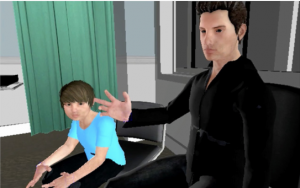A variety of Virtual Reality applications already have a considerable impact in healthcare, ranging from hands-on technical training to master novel surgery techniques, for instance, to the development of novel behavioural therapies for patients.
Yet so far the benefits of virtual scenarios to help healthcare professionals develop the social and intuitive skills that underpin positive interactions with patients have been under-appreciated.
A cross-disciplinary team of academics at the University of Birmingham, recently carried out a study using virtual reality to focus our attention on a professional skill that is not easily taught by traditional means: the ability to spot signs of child abuse.
Given their frontline role, it is essential that GPs react appropriately to such signs. Yet the art of seeing past a patient’s immediate query, to take into account the wider context, including the presence of potentially vulnerable children, depends on intuitive and perceptual skills that are not easily acquired without the benefit of experience and role models.
When asked to feed back on their experience of a ‘virtual consultation’, doctors from our study commented that the virtual scenario we used seemed realistic – “like I was part of the consultation rather than watching a simulation”. This was despite technical limitations, such as characters lacking facial expressions and not being able to examine the patient. Importantly, they also highlighted that the virtual reality captured some pressures of a real consultation – for example, it “felt stressful” and “evoked a sense of discomfort”.
Sixty-four GPs and trainee GPs took part in our study. We looked at how professional experience, stress levels, and personality traits related to the quality of the notes taken by the GP at the end of the virtual consultation. We designed the scenario so as to focus the participants’ attention on the patient’s complex medical condition, rather than his aggressive behaviour towards his son. We manipulated the latter’s degree of aggressiveness, while the son’s behaviour remained the same. We found that this manipulation significantly affected how well participants picked up on the child-safeguarding concerns. This suggests that, in practice, doctors may respond to cues in an adult’s behaviour, even though child abuse guidance and training recommend looking out for cues from the child.
We also found that GPs who are less stressed, less neurotic, more agreeable and extraverted are better at raising the child abuse issues in their notes. These incidental results - particularly those related to stress - warrant further studies aimed at developing improved ways of supporting time-poor GPs, who are confronted on a daily basis with emotionally charged, difficult situations.
It is clear from our participants' comments that Immersive Virtual Reality has considerable potential as a professional interaction training tool that is both scalable and replicable. In the domains of mental health and paediatrics, where the use of actors can be particularly problematic, immersive virtual reality provides a unique chance to apprehend difficult situations in a way that allows for both repetitive immersion and group discussions aimed at teasing out ethical quandaries. Indeed there are reasons to think that virtual reality may be a potent type of intervention, as it reliably taps into the ‘raw’ emotional and intuitive reactions that are not necessarily mobilised through roleplay, and often escape our awareness.
